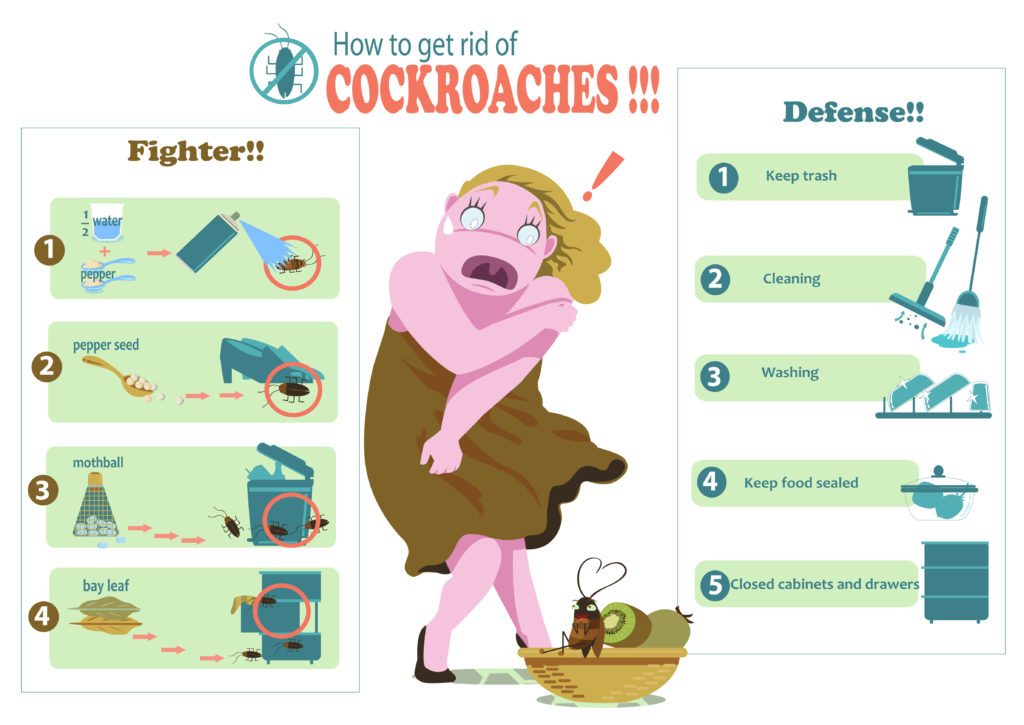
DIY Pest Control—Does It Work?
There’s a big green movement happening and a lot of people are becoming more consciences of their product choices. When it comes to pest control though, it can be pretty difficult avoiding chemicals that create run-off or are harmful to pets. Just like my previous article on Cleaning Your Home and Yourself Conscientiously, there are a lot of DIY pest control recipes out there, but the question is—do they work? Well, I did some snooping around and found an answer, curated for your easy-viewing pleasure. Enjoy.
DIY Roach Control
First off, you can cut down on roach and ant infestations by simply wiping down your counters. Ensuring there’s no crumbs or open food around will prevent these bugs from wanting to come inside. It’s also a good idea to organize your cabinets and other dark spaces, making sure there’s not a lot of paper bags lying around. Paper bags are neon signs for vacancy when it comes to roaches.
Baking Soda & Dish Soap

Besides the prevention techniques, there’s also apparently a few DIY roach control recipes. When searching, I found that baking soda and sugar make a great alternative combo. The sugar acts as a lure for the ants, and baking soda is one of the best roach killers that doesn’t involve chemicals. While this makes a good DIY roach trap, there is an active alternative spray as well.
- 1 teaspoon dish soap
- 1 tablespoon baking soda or borax
- 12 drops of peppermint oil
- water
Catnip and Cinnamon

Catnip is a great deterrent for roaches and mosquitos. If you have cats, you can have a little catnip garden outside on your porch to keep away the bloodsuckers, and fill sachets to store in the roach-prone areas of your home. You can also boil catnip down into an oil and use a mixture of it and water to spray the entryways into your house.

Cinnamon works as an all-around insect repellent; however, the aromatic quality that works as the repellant does not last long. I’ve looked around on blogs and Q&As and the consensus is that, while in theory it should keep the bugs away, it just doesn’t last long enough to be practical. If you do need a short-term solution, stashing some cinnamon sticks in key problem locations can help keep away ants, roaches, etc., and it can make your home smell nice—just don’t expect it to be effective for long.
DIY Spider Control
Spiders like dark, humid areas to nest in. The quickest, easiest way to eliminate them from wanting to make their home in your home is to dehumidify the area. Let’s say you’ve got a spider problem in your cellar or basement. Find a dehumidifier like this one and maintain a 40% humidity level, dusting away the preexisting areas.
No chemicals are needed, only preventative measures. This will also help keep other crawly beings from worming their way into your home, as most like those damp areas. Without the dampness, you have less of a problem.
DIY Ant Control
Just about everyone has ant problems at some point in their home. Just like with roaches, making sure no food or sugar is left lying around is your best bet to prevent ants from wanting to enter in the first place. Sometimes that’s not enough though.
If you have shrubs or large plants planted alongside your house, make sure to keep them in check and prune them regularly. Carpenter ants like to climb up and find their way through the wood parts of your home that way, and it’s an easy enough prevention to start with. You can also go around your home, finding where any large ant colonies are, and pour boiling water on them. Boiling water will do the job of killing the ants without the use of pesticide.

Of course, like previously stated, ants also hate baking soda. If the ant colonies are a little more aggressive and a pot of boiling water doesn’t do the trick, try sprinkling baking soda on the mound and pour/spritz the area with white vinegar. You can line a little baking soda along the edges of your home outside, and also leave citrus peels. Ants hate the strong smell of citrus, so leaving peels in the garden or at the base of your home is a good way to ward them away. Of course this won’t stick forever, but if you’re an avid eater of oranges and grapefruit, then you can regularly compost them outside.
DIY Pest Control Works

Yes, unless you have a crazy infestation, any DIY trick will work. Honestly, the best measures you can take are preventative ones. Having a closed-top trash can will help contain smells and therefore temptation when it comes to roaches, flies, and mice. Putting open food away in containers rather than just rolling the top of the bag up will ensure bugs don’t smell and get into your food. Making sure your sink drains are clear of extra food and cleaning them regularly is also a great practice to get into.
And wipe down your countertops! So many crumbs and little water spots go such a long way to attract bugs, and by wiping away residues and dampness, you’ve eliminated the want for a bug to stroll into your kitchen. If you still have a problem, then of course you can resort to any of the above listed recipes for an attack plan, not to mention the hundreds of other ideas floating around the internet. It’s not necessary to use chemical pesticides unless you have a huge problem.
It’s important to take care of your home, including preventative work. Making sure you keep a clean, bug-free home will make it so you have less problems in the short and long run. This also means less money spent on bug-infested food, exterminators, or any potential illnesses carried by pests. Using natural and preventative pest deterrent also helps reduce costs on more expensive options that might otherwise weigh down on your budget. To learn more about what other items might be burning through your wallet, you can check out this article here.




